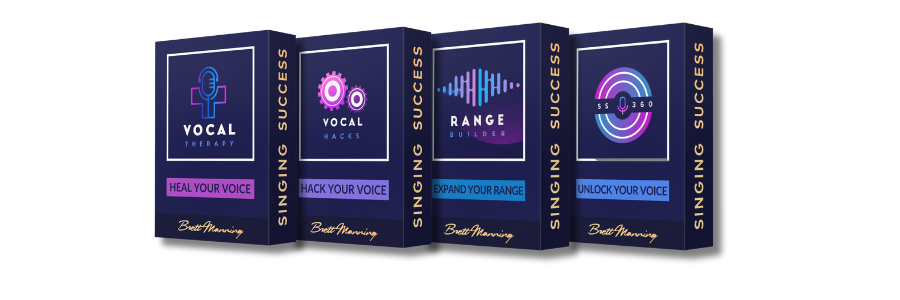“My throat hurts” is one of the most common stressful situations for a singer to experience, especially with a performance just around the corner.
Just as any musician would care for their instrument, singers must go to great lengths to protect their voices. The word “voice” spans many aspects to consider, including your vocal cords, throat muscles, breath support, and other related muscles.
A Shocker About Your Sore Throat
When your throat muscles—at least the ones you can feel and we can see—feel raw and inflamed, that’s a warning sign that your voice as a whole is in trouble. But here’s the shocker:
The vocal cords don’t have nerve endings. This means you can’t actually feel the cords. You can only feel the surrounding musculature and the increased difficulty when you sing.
Knowing that fact helps you to understand the importance of warming up and training your voice. If it hurts to sing, you actually may be using the wrong muscles to sing. The muscles you feel may be confused with the sound you hear. This is why we get incredulous when we hear people sing high so easily.
A vital principle for the average singer is this: If it hurts to swallow, DO NOT sing. This will spin you backward, and you’ll run the risk of vocal damage and prolonging the underlying issue.
The Importance of Healthy Vocal Cords
We’ve established that, as a singer, your vocal cords are your instrument and require care and consideration. Healthy vocal cords will allow you to exercise your full range and produce a full, pure, and engaging sound.
Even if you’re more Megadeth than Mariah Carey, if you want a career as a singer, your vocal health should be your number one priority, especially if you sing aggressively!
Keeping the voice healthy should concern us because so many professional singers end up needing vocal therapy or even surgery on their vocal cords. For more info on this, read my blog on vocal health: When to Go On Vocal Rest
Many famous singers have spoken out about vocal health. Julie Andrew’s tragic story of losing her voice, and terminating her singing career, all began with a cyst requiring surgery that went horribly wrong.
Since then, she has served as an honorary chair for the Voice Health Institute along with Steven Tyler, Christina Perri, and others.
Can You Harm Your Vocal Cords?
Yes. Some bad habits can result in damaging your vocal cords. Things such as untreated allergies, smoke (first- and secondhand), tension, overuse, and abuse (like screaming) are all potentially damaging to your cords.
Again, if you feel discomfort when singing, consider vocal rest. Vocal rest is the elimination of all vocalizing, singing and talking, for a period of time. It allows your body time to reduce inflammation of the vocal folds without irritating them more and causing vocal damage.
My Story
Years ago, I had a dear friend I knew from my college days. We trained under the same teacher. A total guru, if you know what I mean. And we placed 100% loyalty and trust in this teacher.
Everyone I knew who went to this teacher got better and worse. This brilliant teacher had amazing ideas, but even the best have blind spots.
He tried to synthesize a certain belt technique with the mixed voice method espoused by one of his colleagues, whom I later studied with in L.A.
In other blogs, I’ve told an in-depth story of the great vocal genius, Seth Riggs. In my first lesson, I realized I had been using the WRONG MUSCLES to sing higher notes. In fact, whenever I’d sing, my throat muscles were tight, and I often experienced a pinching feeling on higher notes the second I went above middle C on the piano.
The name of Seth’s methodology was “Speech Level Singing,” and I fully subscribe to this. Without it, my throat always hurt, and my voice was severely limited when trying to sing high notes, make a natural sound, or just trying to hit notes that were never supposed to be that hard.
Years later, after learning to disengage muscles that have NO business assisting—or rather, might I say interfering—with vocal cord vibration, I began teaching as an associate under Seth Riggs and eventually as a Master associate, which was the honor of a lifetime.
I was known in my community as an innovator and the man who could “see inside your voice with his ears.” Throughout my life, I’d done a LOT of things and was quite average. But this was not one of them.
So my friend from college had given up on singing but ran into me and heard the drastic, positive changes in my voice. She immediately thought she’d humor me and take a lesson.
The breakthroughs were IMMEDIATE. Suddenly her pitch problems mostly disappeared, and high notes came naturally.
But the biggest revelation was after the lesson when she said…
Wait for it…
“Hmm, I don’t have a sore throat from singing!!!”
This eventually was my calling card. Of all the things I’ll discuss here, I can say that I’ve taken the throat pain out of the singing process! I’m so thankful I get to help others sing for a living!
Vocal Fatigue
There are many reasons one could experience pain while singing and a sore throat could develop. Let’s begin with the most simple and work our way up from there.
Vocal fatigue is when a singer has pain in the throat, and their vocal tone becomes hoarse or raspy. It can stem from overworking the voice, not warming up, and incorrect—sometimes downright horrible—technique.
To circumvent fatigue, avoid yelling and talking too loudly for too long. Also, utilize a thorough warm up before practice and performance.
Laryngitis: Symptoms of Abuse and Illness
Understanding Laryngitis
Mount Sinai Hospital defines laryngitis as:
Swelling and irritation (inflammation) of the voice box (larynx). The problem is most often associated with hoarseness or loss of voice.
Laryngitis is extremely crucial to understand and discern. HOWEVER, self-diagnosis can be tricky. This is why I constantly stress the importance of knowledgeable coaches and a reputable throat doctor (ENT).
Notably, irritated or inflamed vocal cords won’t close efficiently, thus preventing you from singing clear tones or hitting high notes. A swollen voice will cause you to produce a rougher, more breathy sound throughout your range.
If you experience this, vocal silence is the first step. And no matter what, no singing, no yelling, and avoid whispering. This airy sound still inflames your vocal cords. And once you’re in the state of recovery, be sure to check in with your coach to gently rehab before you start to sing again.
This is the time when I get to zealously proclaim that my Vocal Rehab course has helped countless singers, and the testimonials regularly flow in as singers use this groundbreaking program. Learn more about it here: Vocal Therapy
Also, if you don’t experience immediate recovery or if you’re getting worse by the day, GO SEE A DOCTOR!
Symptom of Abuse
While we can often recognize when no symptoms of illness are present, and identify when vocal stubbornness is the consequence of singing too loudly or yelling at a sports event (I confess, as a father of 2 very athletic children, I’m very guilty of this), we all have a tendency to push the voice beyond what we have trained for or talk too long and forcefully.
Often, the results are cords that are so swollen or inflamed that the tone is perpetually raspy, and the range is severely limited. An omnipresent sense of throat irritation often arises. Also, a sudden break can develop as a result of developing a sore throat from singing and continuing to sing.
*Note – I’ve sung with mild Laryngitis when my tone quality was compromised, but my throat muscles were fine, and I had no soreness. Strangely, I sing a little easier during this challenge! However, this is NOT recommended. I know my voice after dozens of years of experience under every condition imaginable.
This song was one that I waited long to sing. I knew that there would be an allergy attack or reflux situation that would give me a natural breathy tone and increase vulnerability in this deeply emotional song. Hope you dig it 😉
Fast-Track Your Success!!

VIP Membership includes:
- Exclusive Facebook Group
- Interact with our vocal coaches–ask them YOUR question
- Live warmups
- Masterclasses and Q&As with Brett Manning and his guests
- SS360 QuickStart Program
- SS360 – The FULL Systematic Vocal Course
- Vocal Hacks
- Range Builder
- Mastering Mix
- Mastering Harmony
- Mastering Vibrato
- Vocal Therapy
- Plus…exclusive content only found here all along the way!
You can struggle on your own, or you can get direct access to the Nashville Coaches who have launched some of the biggest names in the music industry.
Symptoms of Illness
In the above-mentioned song, I spoke of having laryngitis and singing anyway. To reiterate, singing with laryngitis is NEVER recommended. You have to know your voice inside and out before doing this.
In my case, my laryngitis was from singing while recovering from sickness. They were Skype sessions, so I wasn’t contagious. Sing responsibly, right? 😊
7 Expert Tips to Avoid a Sore Throat When Singing
1. Be Sure Your Monitors Are Loud Enough
If you’re singing into a mic, it is important to check your in-ear or floor monitor volume level before you begin. If it’s too quiet, it can lead to screaming or simply over-singing, which, as we’ve mentioned earlier, can cause you to use more air, putting excessive air pressure on your vocal cords and causing a sore throat. Even singers who have mastered proper breath support will push too much when they can’t hear themselves properly.
2. Select the Right Key
If you are doing a solo performance, make sure it is in a key that fits your vocal range. Any song you sing should allow you to use a good mix of your chest voice, head voice, and sometimes falsetto. Even professional singers have a preferred key.
Also, every voice has certain money notes, where the shape of your face, vocal cords, resonators, articulators, and air pressure come together on certain pitches and maximize tone on particular notes. A coach should be able to help you identify these notes.
Check out my blog on “money notes,” which will describe how to achieve what is called formant. An expansion of sound without an increase of musculature or air pressure.
3. Stretch Your Vocal Range Strategically
Stretching your voice is a good thing as long as it’s done properly. However, it is important to know your limits. Using proper technique is much more important to a good performance than having a four-octave range.
Remember, an effective methodology coordinates the voice towards high notes and alleviates that stretching feeling in the throat.
4. Do Not Over-Breathe on High Notes
Over-breathing is very common in the higher register. When you reach for that high note, it’s tempting to over-breath. It feels like if you just push a little more, you’ll get there, but it’s not so.
Over-breathing will cause too much strain on your throat muscles by overloading the vocal cords with more pressure, introducing the outer muscles of the larynx and resulting in a sore throat you’re trying to avoid. Vocal lessons, as mentioned earlier, are an easy way to have someone help you learn that control.
5. Maintain Proper Body Posture
Many people scoff at the idea that your posture affects your vocal performance. The truth is, it does! Singers will experience better breath control and be able to produce sound with less effort by simply standing or sitting correctly.
And please, see a chiropractor and/or massage therapist. I have benefitted greatly in my ability to maintain good posture with each visit. And I ALWAYS sing better after a visit. Plus, if you have a tight or kinked neck, an adjustment can bring immediate relief!
6. Avoid Dairy While Singing… Perhaps?
To be sure, I know TONS of singers—including me on most days—who can drink milk, eat a cheese pizza, or have a bowl of ice cream before a performance and be just fine. Maybe not for the long haul. Especially if the quality is poor.
Much of our dairy, unfortunately, is loaded with hormones from steroids designed to fatten cattle quicker to increase profits. These hormones can trigger an allergy response.
Also, antibiotics and a grain-only diet—rather than organic grass-fed cattle—can trigger allergy responses. Find out if you’re actually allergic to milk.
Most dairy, especially ice cream and milk, can (and for some singers, WILL Always) cause phlegm and mucus. This coating on your throat and vocal cords will make you feel the need to clear your throat. If you’ve ever coughed or cleared your throat until it hurt, you can imagine the danger of singing post-dairy, assuming that it affects you negatively.
7. Avoid Coffee?
If you didn’t get enough sleep or ate inflammatory foods, you might be tempted to blame your vocal troubles on caffeine. But I know 1000’s — yes THOUSANDS of singers who won’t sing until they have their coffee. I’m one of them.
But, caffeine tends to dehydrate, so you have to stay ahead of the game and do all the hydration techniques mentioned in my blog titled “Vocal Hydration: How to Fix a Dry Throat.”
In the end, everyone is different. Some people are grossly allergic to caffeine. So, of course, they should avoid coffee.
You can try different nutritional protocols and sing on your standard diet. Then sing after eliminating certain so-called ‘danger foods.’ If you sing better without them, who can argue with you? But you have to make that call.
Overcome Sore Throat Muscles…
There are ways to overcome a sore throat and keep your throat healthy, so don’t freak out.
If you feel a sore throat coming on, take vocal naps.
If you’re experiencing allergies, drink lemon tea, throat coat tea or, my favorite, Calli Tea. Also, some singers strongly endorse the use of a neti pot for allergies. A neti pot is used to flush the nasal passages and clear the mucus out with a salt water solution. Do your own research on any saline (salt water) nasal treatments. There’s controversy about side effects. Ask your doctor and make up your own mind.
If you have a cold, rest. Remember, it’s important to be gentle with your voice. Most people are sleep deprived and the voice needs sleep to recover.
Finally, if you are serious about your vocal career and are consistently experiencing a sore throat or strained vocal cords, you need a trusted, certified coach!
Run through our quick checklist…
One of the simplest ways to help yourself whenever your throat hurts is to run through a quick checklist asking, “Why does my throat hurt?” This is a summary of what you may need at-a-glance:
Bad technique- This is the first place to check if you’ve never experienced painless singing.
Lazy warm-up habits- Sorry to be blunt, but assuming the first point in this checklist is good to go, you might be the cause. NEVER skip the warm-up.
Lack of physical warm up- Increasing circulation and warming up your body decreases the time necessary to warm up your voice. Save your voice for singing, and don’t wear out by taking too long on cold cords.
Bad health- sickness, allergies, reflux, diagnosis of inflammatory issues, or some other related issue.
Bad nutrition- Too much caffeine, alcohol, illicit drugs (and even some prescription drugs).
Horrible sleep-One of THE biggest killers of the voice. This includes sleeping with your mouth open (bad sinus issues can cause this) and restless or insufficient sleep.
Emotional stress- Ask yourself an honest question, “am I well?.” Seek counseling if necessary.
Vocal fatigue- Whether habitually pushing your speaking voice or singing voice, you should know how much you can take by now.
Physical fatigue-This is a huge drain on the voice. You cannot sing to the top of your game when you’re in a state of fatigue.
Travel stress- Time zones interrupt the body’s circadian rhythm. Also, the change of climate, temperature, pollen and mold in the air, humidity, and elevation affect the voice.
Get Diagnostic Vocal Coaching
Systematic training is universal and great for the ‘self-taught’ singer who simply needs a plan. BUT…. pros train with a vocal coach. One-on-one coaching is what we’ve termed at Brett Manning Studios, as diagnostic vocal coaching.
This type of coaching is often for those trying to fix or prevent vocal damage, sometimes with the assisted guidance of throat doctors (ENT). A great coach can assist you in knowing what your voice is capable of under stress as well as helping you keep your throat healthy while you sing.
My uber-talented associates immediately help clients sing without pain, improve their overall sound (tone and style), free up the high notes, and enable a deeper self-expression that sets them apart.
Sometimes singers have to come to us after surgery or vocal rest due to vocal nodes or nodules. We can hear the swelling in the vocal cords (not ‘vocal chords’…. this spelling refers to a musical chord), the extremely limited vocal range, throat tightness, lack of breath support, and overall stress levels.
Also, a diagnostic coaching session or visit to an ENT can help you discern if you’re getting a sore throat from singing, sickness, or some other cause. A sore throat sometimes arises from a combination of factors. For example: allergies, muscle fatigue/muscle tension, it’s cold outside, etc.
Protect your voice. Train with a systematic vocal training program or with a great coach. Know when to get help. We are here at Brett Manning Studios to help you all along the way.






